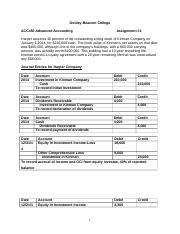
To prevent malicious exploitation, AI technologies need to be robust and secure. AI is good at data processing and analysis, but it’s not as creative or intuitive as humans. It may be tough for AI systems to do tasks that require quickbooks self-employed 2020 innovation, imagination, and a deep understanding of abstract concepts. By automating routine tasks, AI saves businesses money by reducing the need for human labor. This can include lower staffing costs, minimized errors, and increased operational efficiency. Businesses can take advantage of this capability to get valuable insights, make data-driven decisions, and identify patterns they didn’t see before.

But with recent developments in the field of AI, researchers now believe it may happen within the next few decades, though they don’t know exactly when. With these rapid advancements, it becomes even more important that the safety and regulation of AI be researched and discussed at the national and international levels. Now that we’ve covered the everyday risks of AI, we’ll talk a little about some of the hypothetical risks. These may not be as extreme as you might see in science fiction movies, but they’re still a concern and something that leading AI experts are working to prevent and regulate right now. Beyond that scenario, there are others that could cause physical harm to humans. If companies rely too much on AI predictions for when maintenance will be done without other checks, it could lead to machinery malfunctions that injure workers.
- With AI, businesses can provide personalized experiences based on user behavior and preferences.
- As an example, he pointed to AI’s use in drug discovery and healthcare, where the technology has driven more personalized treatments that are much more effective.
- AI-powered tools can help manage and optimize various aspects of work, such as prioritizing tasks, scheduling meetings, and automating routine processes.
Eric Horvitz, chief scientific officer at Microsoft and co-founder of the One Hundred Year Study on AI, praised the work of the study panel. We now have people who do work in a wide variety of different areas who are rightly considered AI experts. But they now face exponentially higher risk with AI, with its ability to operate 24/7 and to operate at an unprecedented scale. “At the end of the day, AI is a statistical machine. It’s working on probabilities. The number of times it gets things wrong is very, very small, but it’s not zero.” Similarly, many are concerned about how to protect sensitive data in the era of AI.
As AI’s next big milestones involve making systems with artificial general intelligence, and eventually artificial superintelligence, cries to completely stop these developments continue to rise. In fact, AI algorithms can help investors make smarter and more informed decisions on the market. But finance organizations need to make sure they understand their AI algorithms and how those algorithms make decisions.
The next disadvantage of AI is that it lacks the human ability to use emotion and creativity in decisions. Some suggest self-aware AI may become a helpful counterpart to humans in everyday living, while others suggest that it may act beyond human control and purposely harm humans. Self-aware AI has yet to be created, so it is not fully known what will happen if or when this development occurs. Although legal regulations mean certain AI technologies could eventually be banned, it doesn’t prevent societies from exploring the field. AI still has numerous benefits, like organizing health data and powering self-driving cars.
What are the disadvantages of artificial intelligence?
“And as long as people are fooled into thinking this is real content, it will be a problem.” Using AI to advantage hinges on knowing the technology’s principal risks, said Eric Johnson, director of technology and experience at West Monroe, a digital services firm. As an example, he pointed to AI’s use in drug discovery and healthcare, where the technology has driven more personalized treatments that are much more effective. To deliver such accuracy, AI models must be built on good algorithms that are free from unintended bias, trained on enough high-quality data and monitored to prevent drift. On the business side, data shows that executive embrace of AI is nearly universal.
How to Mitigate the Risks of AI
Brown University — Artificial intelligence has reached a critical turning point in its evolution, according to a new report by an international panel of experts assessing the state of the field. But as AI takes over those entry-level jobs, some have voiced concerns that people could lose their ability to know and understand how to perform those tasks. It could also leave them without the necessary capabilities to step in and perform the work how to calculate commission should the AI fail.
Ethical Considerations of AI
Robots perform all tasks, eliminating the risk of human error and injury in hazardous environments. Another significant benefit of AI is that humans can overcome many risks by letting AI robots do them for us. Whether defusing a bomb, going to space, or exploring the deepest parts of oceans, machines with metal bodies are resistant and can survive unfriendly atmospheres.
In dynamic environments, they can adapt to changing situations, learn from experience, and come up with optimal solutions. Elsewhere, AI systems are diagnosing cancers and other conditions with accuracy that rivals trained pathologists. Research techniques using AI have produced new insights into the human genome and have sped the discovery of how to calculate the benefit to cost ratio new pharmaceuticals. And while the long-promised self-driving cars are not yet in widespread use, AI-based driver-assist systems like lane-departure warnings and adaptive cruise control are standard equipment on most new cars. The compute power required for AI systems is high, and that’s driving explosive demands for energy.
最近のコメント